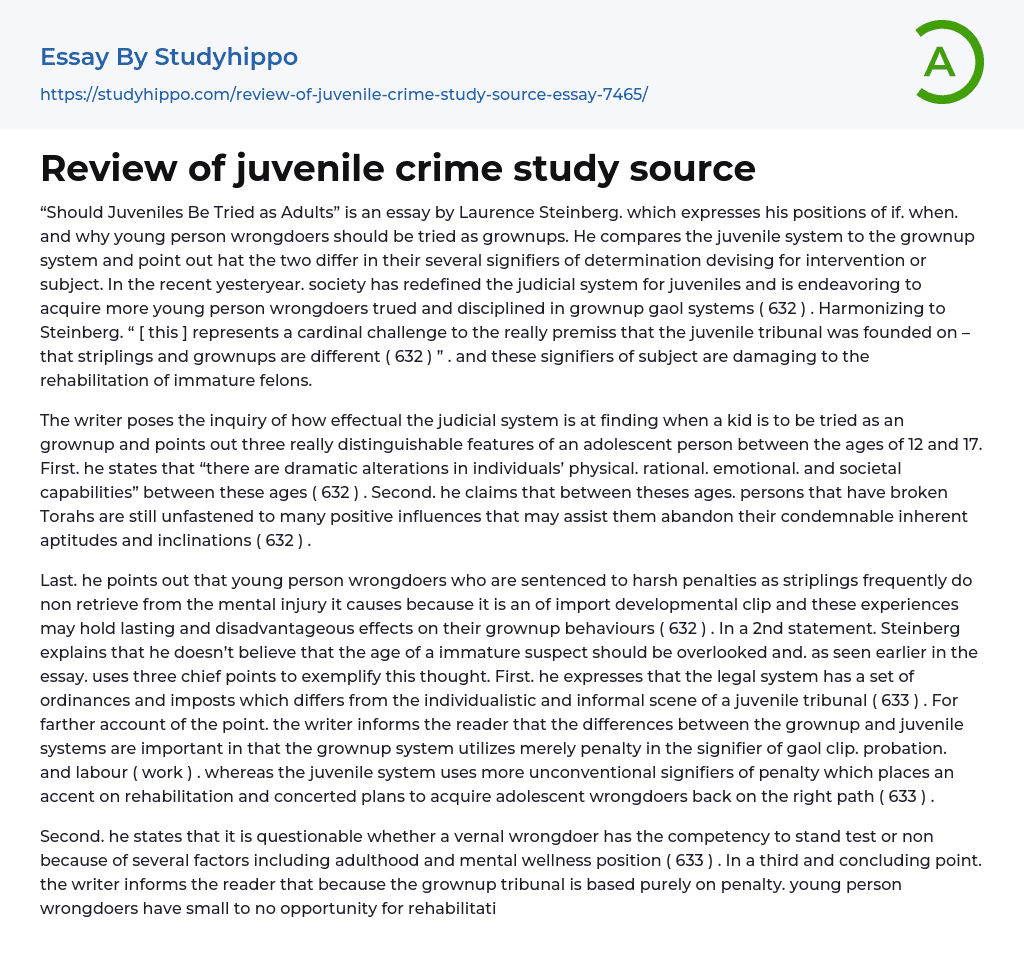In his essay "Should Juveniles Be Tried as Adults," Laurence Steinberg discusses the topic of treating young offenders as adults and compares the juvenile and adult systems. He emphasizes that society has been attempting to redefine the juvenile justice system in recent times, aiming to discipline more young offenders in adult prisons (632). However, Steinberg argues that this challenges the fundamental belief of the juvenile court, which is based on recognizing differences between adolescents and adults (632). According to him, such forms of punishment hinder rehabilitation for young criminals. Steinberg raises questions about the effectiveness of the judicial system in determining when a child should be tried as an adult, highlighting three distinct characteristics of adolescents aged 12-17. Firstly, he points out significant changes in their physical, intellectual, emotional, and social capabilities during this stage (632). Secondl
...y, he suggests that individuals within this age range are still receptive to positive influences that can help them overcome criminal tendencies (632). Lastly, Steinberg believes that young offenders may not have adequate opportunities to learn from their mistakes and rehabilitate effectively.In the text, it is argued that imposing harsh penalties on young wrongdoers can have long-lasting negative effects on their adult behaviors. This is because the stage of development during youth is crucial. It is also emphasized that there are significant differences between the legal system and the juvenile court system. The adult system focuses solely on punishment like jail time, probation, and labor, while the juvenile system uses unconventional forms of punishment that prioritize rehabilitation and cooperative programs to guide adolescent offenders back onto the right path. Additionally, there are doubts raised about whether young offenders hav
the competency to stand trial due to factors such as maturity and mental health status. Ultimately, it is asserted that an emphasis on punishment in the adult court system may hinder opportunities for learning and rehabilitation for young offenders (634). As a solution, a different approach within the legal system is suggested for certain age groups. Specifically, it is firmly believed that children below 12 should not be tried as adults. Furthermore, individuals older than 16 are considered not significantly different from adults. For those between 12 and 16 years old, a personalized evaluation of circumstances considering mental, social, and rational aspects is recommended (635).The author emphasizes that determining whether youth offenders should be tried as adults is a difficult decision. Completely overlooking their age is like ignoring a noticeable elephant in the courtroom; while it may be possible, most individuals will sense that something is not right (635).
- Jurisprudence essays
- Social Injustice essays
- Juvenile Justice essays
- Agreement essays
- Business Law essays
- Common Law essays
- Community Policing essays
- Constitution essays
- Consumer Protection essays
- Contract essays
- Contract Law essays
- Copyright Infringement essays
- Court essays
- Crime essays
- Criminal Law essays
- Employment Law essays
- Family Law essays
- Injustice essays
- Judge essays
- Jury essays
- Justice essays
- Lawsuit essays
- Lawyer essays
- Marijuana Legalization essays
- Ownership essays
- Police essays
- Property essays
- Protection essays
- Security essays
- Tort Law essays
- Treaty essays
- United States Constitution essays
- War on Drugs essays
- Animal Cruelty essays
- Charles Manson essays
- Crime Prevention essays
- Crime scene essays
- Criminal Justice essays
- Criminology essays
- Cyber Crime essays
- Damages essays
- Detention essays
- Distracted Driving essays
- Drug Trafficking essays
- Drunk Driving essays
- Forensic Science essays
- Gang essays
- Hate Crime essays
- Homicide essays
- Identity Theft essays




